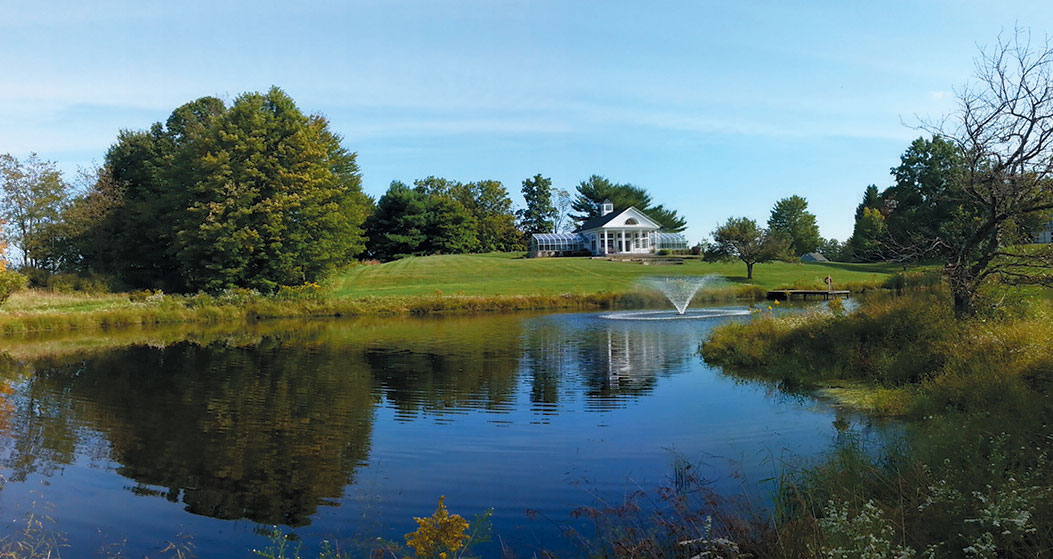Hopewell Therapeutic Farm
“I am just lucky to be here,” says Cynthia Lauren, a resident of Hopewell Therapeutic Farm in Mesopotamia, Ohio.
Hopewell Therapeutic Farm is the only one of its kind in Ohio, and one of few in the nation. Established in 1993 by Clara T. Rankin, the non-profit organization helps individuals with serious mental illness get back on track with their lives. Located in the middle of 306 acres of farmland and surrounded by forestry, the farm allows nature to serve as an integral asset in the resident’s healing process. The most effective aspect of Hopewell, however, is the sense of community the staff fosters.
“Community. It is the essence of our entire therapeutic approach,” says Clinical Director Daniel B. Horne.
Daniel began working at Hopewell in 2011 after the Admissions Director contacted him about an opening. He says he knew from the moment he pulled onto the farm that he would have to stay. Shortly after visiting, he quit his job—which was just a three-minute commute from his home—and five years later, he continues to make the hour-long drive to Hopewell nearly every day.
“My involvement here has shown me the amazing potential of people that much of society is afraid of…[they can] positively contribute to our society,” says Daniel.
Not only does the staff at Hopewell help adults who have been diagnosed with a mental illness, they also work hard to promote a healthy attitude about mental illness. A variety of mental health providers and advocacy organizations work alongside Hopewell in order to reduce the stigma associated with mental ailments, by engaging in speaking events and periodically publishing works of research.
In addition to branding a positive outlook on mental illness, Hopewell considers nutrition a large facet of the services they provide. Staff and residents share three meals a day and the menu is constructed so that optimal health needs are met for each individual. Before admission into Hopewell, residents are required to meet with a certified nutritionist, who assesses their eating patterns and works with them to develop healthier habits. Since Hopewell is located on a farm, a lot of the food that appears on the plate comes directly from the garden, greenhouses and livestock on the property.
“We avoid highly processed foods, and we grow and raise natural food items here on the farm,” says Daniel. “We have a herd of Belted Galloway beef cattle, we raise chickens for eggs and [their] meat, as well as pigs, lambs and turkeys.”
What they cannot produce, they purchase from farms as close to the vicinity as possible. Part of the organization’s philosophy entails that food be sourced from as short of a distance as possible. The food is one of Cynthia’s favorite things about Hopewell. She raves about how healthful her selections are from breakfast to dinner.
“Everything is fresh. We even grow the asparagus and tomatoes right here on the property,” Cynthia says. “We have a lot of chicken and fish. Everything is grilled and baked. We eat healthfully, and it’s good food.”
Cynthia admitted herself into Hopewell on October 5, 2015, when she realized her battle with bipolar disorder had been going on for too long. Similar to all residents, she is welcome to stay at Hopewell for up to three years. The average stay, however, ranges anywhere between four to nine months, so her visit will end in mid-May. Currently, Hopewell houses 34 residents among four buildings on campus, but they have the capacity to house 38. Additionally, there is an extended-stay program that allows a maximum of 10 residents live at Hopewell for the remainder of their lives.
The fundamental piece of Hopewell’s mission goes back to its community-based therapeutic approach. Cynthia enjoys the 20-minute meeting she gets to engage in with other residents between their work shifts. She refers to these gatherings as time to interact within her process group, which is a handful of people that come together to reflect on their day, read and/or talk about spirituality.
Residents involved in work shifts are a part of what’s called the “work crew” and these positions are essential because they enable residents to be involved in their community. Just recently the Farm & Craft Market reopened, where a certified art therapist works with the residents who are in the garden/art crew to create art projects that can be sold at the market. They are also required to work at the market to boost their self-confidence about engaging with those outside of Hopewell.
Ultimately, Hopewell serves as a sanctuary for those who are seeking to regain balance and structure in their lives.
“It’s really an incredible place,” says Cynthia.
Hopewell Therapeutic Farm
9637 St. Rt. 534; Middlefield, Ohio 44062
440-426-2009






